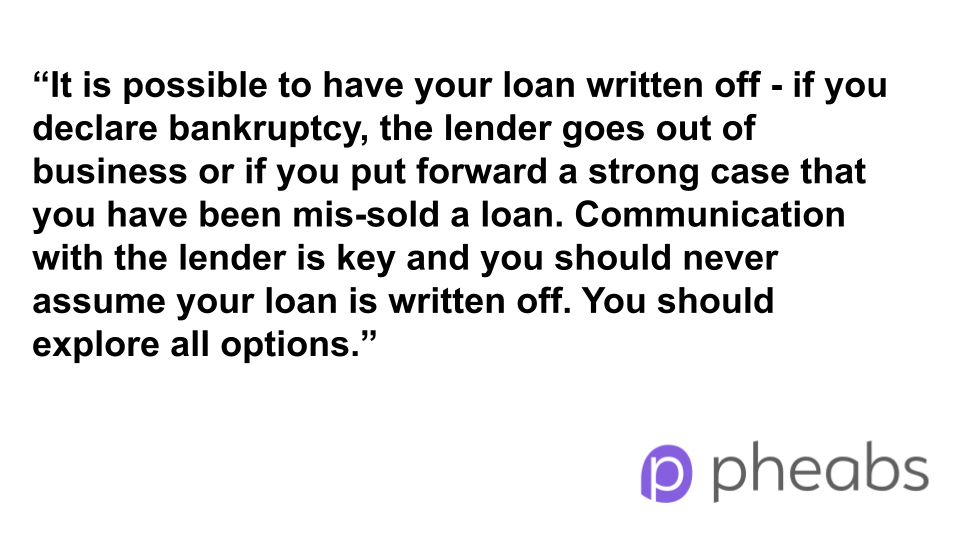Last Updated on October 24th, 2023 at 03:01 pm
In some cases, it is possible to get your loan written off. Maybe your loan is very overdue and you cannot find a way to repay it. Or perhaps you are getting lots of calls, emails and letters from the lender and want these to stop.
A loan is essentially written off when the lender ‘writes off’ your outstanding balance and says that you no longer need to repay anything. Maybe you have $30 or $50 left to pay and they say ‘don’t worry, we’ll wipe it off’ and there is nothing left to pay.
Whilst it is not always common to get your loan written off, there are some ways to go about this, such as declaring bankruptcy, having someone pay the loan off for you and or if you are physically unable to earn income or if you are deceased.
This guide from Pheabs aims to explain all the options available to you if you are looking to get your loan written off.
If you are struggling to repay your loan, there are always options and you read our guide here for more information.
Types of Loans You Can Get Written Off Include:
- Payday loans
- Title loans
- Secured loans
- Personal loans
- Unsecured loans
Ways That Your Loan Can Be Written Off
1. Your Declare Bankruptcy
By becoming officially bankrupt, you are entering a legal state that confirms you have no money. Once this has been confirmed and actioned by the court, this will certainly stop the lenders sending you lots of emails and letters in the mail because they realize that you do not have immediate funds to repay.
In most cases, your loan will still be due, albeit the lender will be patient and be willing to accept payment over the next several months or years, even in very small amounts. But depending on the lender and the amount due, some might just write if off. You should never assume this, you should have a conversation or some kind of correspondence with your lender to confirm this.
2. You Pass Away
Of course, if you are no longer alive, you will no longer need to pay your loan, although this is commonly passed onto your next of kin or the repayments of a payday loan or secured loan will come out of your overall estate. But there is a long process for this sometimes, since the lender won’t always know if you have passed away and who the next of kin is – and if it is long overdue, it might be written off.
3. Your Loan Was Mis-sold
If you were given a loan that you could not afford, or if your loan was topped up again and again without sufficient checks, you could be eligible to make a claim that your loan was mis-sold to you. This is not common at all in the US, but in the UK, there has been over $1 billion in payday loans that has been written off, reclaimed and paid out in compensation to previous borrowers.
You would have been eligible if you were unemployed, were offered loans that you could not afford or if you were offered additional loans without any questions about your income or employment. All the claims in the UK typically went through a lawyer, so you could speak to an attorney about this and if you have a strong case together, this could be put forward and potentially written off.
4. Your Loan is Paid in Full By You or a Relative
It is very common that a parent or spouse steps in and pays off a loan for you – taking away the stress and pressure of having lenders chasing you down for payment. By paying off the balance, this would indeed write off the loan.
This could be an opportunity to negotiate, since lenders just want to get their money back and some interest. So your parent or relative could push and say: “We know that $300 is due, but we can pay you $220 now and that could close it. Otherwise, we have other people to repay and we won’t be able to come back to you in well over a year.” – It’s not impossible, but some lenders would take this and write off the loan.
5. The Lender Goes Out of a Business
Another instance is that the lenders goes bust and out of business, which again was very common in the UK. Once the lender goes into liquidation, they essentially try to recover whatever they can, whether it is 50% or even just 10% of the loan amount. But with some lenders who have gone under, there is no one chasing you up for repayment, so potentially your loan could get written off. If the company goes under, do not take the first offer, you have another opportunity to negotiate and pay off the minimum.
Does Your Loan Deserve To Be Written Off?
In many respects, it is unfair to borrow money and the avoid paying it. After all, the lender has put their faith in you and given you a large sum upfront.
But in some cases, there is a good reason that your loan can be written off. And one of the strongest reasons is if you have faced bankruptcy or have receive top-ups or additional loans without any further checks by the lender. If the top up or extension was instantly approved, this could mean that it was a no credit check loan – and this could make the loan void.
Finally, you should never assume that your loan is written off, you will need to speak to your lender and receive written confirmation that there is no longer an outstanding balance.
How To Get a Loan Written Off – A Step-by-Step Guide
1.Speak To The Lender
You have to start by communicating with your lender – but ignoring any emails, calls and letters, the fees are going to keep being added. Speak to them and assess your options. If you are bankrupt or unemployed, tell them. If you can afford small amounts, come up with a plan (see plan).
2. Make an Arrangement
An arrangement is a very common way to pay off an outstanding loan in much smaller amounts and this is recognised by all lenders. If you cannot afford $100 in one go, try paying off $20 a month for 5 months. This may impact your credit score slightly, but it is a formal way to pay off your loan and will eventually get the loan written off.
3. Put forward a case
If you believe that you should have been offered loans, credit and top-ups, because of your financial position, mental health, income or employment level, you can speak to an attorney and put forward a formal case to have the loan written off. This has been very successful in the UK and is a way to explore your options, especially if you owe thousands of dollars.


